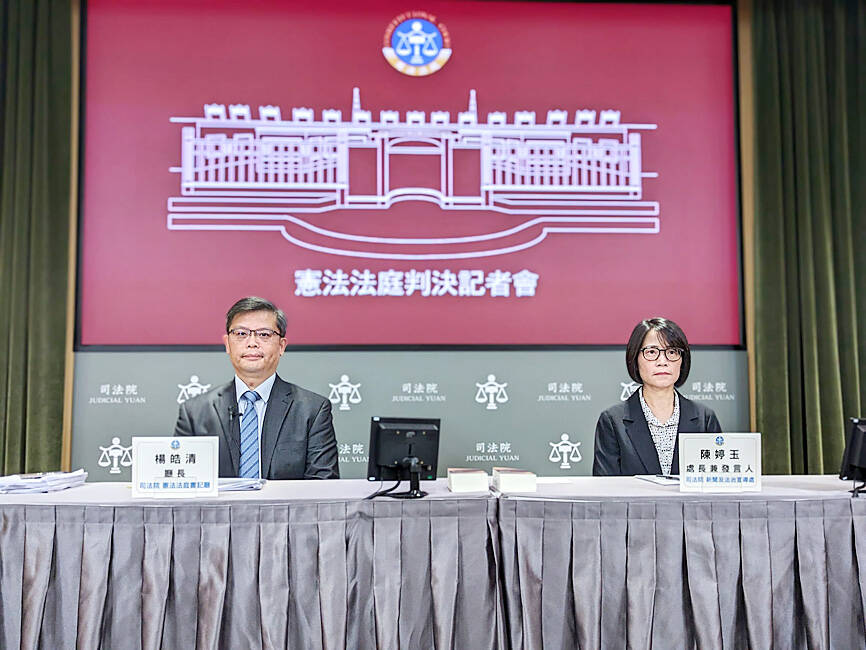Individual doctors may now post advertisements for their practices, after the Constitutional Court yesterday partially struck down an article in the Medical Care Act (醫療法) that banned anyone except medical institutions from advertising medical services.
The ban on medical advertisements by individual doctors stipulated in Article 84 of the act was ruled unconstitutional, as it infringes on freedom of speech and occupation, and the right to equal protection, the court said in a news conference marking the decision.
The court’s judgement, which took immediate effect, voided the ban for individual doctors, while keeping in place the ban on medical advertising by all other people and entities, said Yang Hao-chin (楊皓清), director-general of the court’s clerk department.

Photo: Wu Cheng-feng, Taipei Times
Constitutional Judgement No. 17, 2023, was made following a request for an interpretation made by the Taipei Administrative Court in relation to a fine being appealed by a doctor surnamed Huang (黃), he said.
Huang was ordered to pay NT$50,000 over two Facebook posts promoting a cosmetic injection for wrinkles and hair loss in October 2015, Yang said.
The court consulted the Taiwan Medical Association and Ministry of Health and Welfare in making the decision, Yang said.
The association told the court that it considers the ban a defect in the nation’s medical laws and that credentialed medical doctors should have the right to advertise their practice, he said.
The ministry argued that its ban on individual doctors posting advertisements is proportionate, limited in scope and important to the public interest, but furnished no evidence, Yang said.
The ministry also argued that freedom of speech protections do not apply to medical advertisements, as they are not expressions of belief or conscience, he said.
The court believes that the discrimination against individual doctors does not meet the public interest standard, since the article was written just for administrative ease, he said.
It also found no reason to believe that a meaningful difference exists between medical advertisements posted by individual doctors and hospitals in terms of the public’s right to sound medical information, he said.
Another piece of evidence suggesting the restriction was unnecessary was that the Taiwanese medical field had done without it for 40 years, starting from the promulgation of the original medical care act in 1943 until the ban’s enactment in 1986, Yang said.
Further, banning individual doctors from advertising arguably deprived patients of the information they needed for making fully informed medical decisions, thus harming the public interest, he said.
Huang is the only doctor to receive relief for breaching the law, as he was the sole plaintiff, Yang said.

US President Donald Trump said "it’s up to" Chinese President Xi Jinping (習近平) what China does on Taiwan, but that he would be "very unhappy" with a change in the "status quo," the New York Times said in an interview published yesterday. Xi "considers it to be a part of China, and that’s up to him what he’s going to be doing," Trump told the newspaper on Wednesday. "But I’ve expressed to him that I would be very unhappy if he did that, and I don’t think he’ll do that," he added. "I hope he doesn’t do that." Trump made the comments in

NOT AN OPENING: Trump’s violation of international law does not affect China’s consideration in attacking Taiwan; Beijing lacks capability, not precedent, an official said Taiwanese officials see the US’ capture of the president of Venezuela as a powerful deterrent to Beijing’s aggression and a timely reminder of the US’ ability to defeat militaries equipped with Chinese-made weapons. The strikes that toppled Venezuelan President Nicolas Maduro signaled to authoritarian leaders, including Chinese President Xi Jinping (習近平), US President Donald Trump’s willingness to use military might for international affairs core to US interests, one senior official in Taipei’s security circle said. That reassured Taiwan, the person said. Taipei has also dismissed the idea that Trump’s apparent violation of international law could embolden Beijing, said the official, who was not

A cold surge advisory was today issued for 18 cities and counties across Taiwan, with temperatures of below 10°C forecast during the day and into tonight, the Central Weather Administration (CWA) said. New Taipei City, Taipei, Taoyuan and Hsinchu, Miaoli and Yilan counties are expected to experience sustained temperatures of 10°C or lower, the CWA said. Temperatures are likely to temporarily drop below 10°C in most other areas, except Taitung, Pingtung, Penghu and Lienchiang (Matsu) counties, CWA data showed. The cold weather is being caused by a strong continental cold air mass, combined with radiative cooling, a process in which heat escapes from

Snow this morning fell on Alishan for the first time in seven years, as a strong continental cold air mass sent temperatures plunging across Taiwan, the Central Weather Administration (CWA) said. The Alishan weather station, located at an elevation of about 2,200m in central Taiwan, recorded snowfall from 8:55am to 9:15am, when the temperature dropped to about 1°C, the CWA said. With increased moisture and low temperatures in the high-altitude Alishan area, the conditions were favorable for snow, CWA forecaster Tsai Yi-chi (蔡伊其) said. The last time snow fell at the Alishan weather station was on Jan. 10, 2018, while graupel fell there